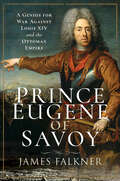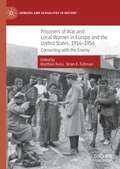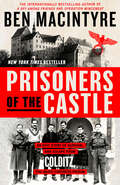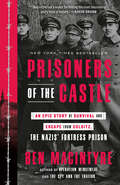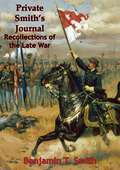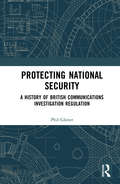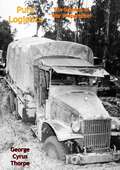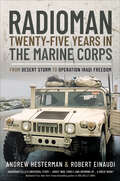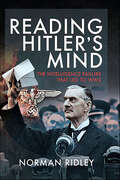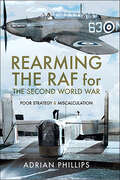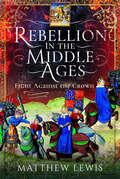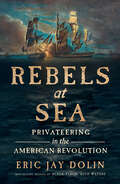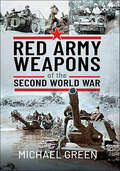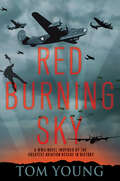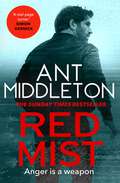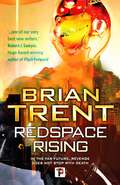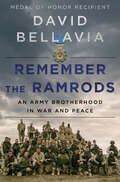- Table View
- List View
Prince Eugene of Savoy: A Genius for War Against Louis XIV and the Ottoman Empire
by James FalknerPrince Eugene of Savoy-Carignan (1663-1736), French born of an Italian mother, was destined for the church, but fled France as a young man and chose the life of a soldier. He entered the service of the Habsburg Emperor Leopold I in 1683 and rose rapidly to become one of the greatest military commanders of the age, playing a leading role in the wars against both the Ottoman Turks and the French. James Falkner, in this the first full biography of Eugene to be published in English for forty years, reconstructs his military campaigns in compelling detail and describes his career as a politician and statesman. Eugene first showed his military genius during the siege of Vienna in 1683 where the Ottoman Turkish threat to western Europe was thrown back, and he commanded the Imperial army at the resounding victory over the Ottomans at Zenta in 1697. Most famously for English readers, he joined John Churchill, 1st Duke of Marlborough in the victory over the French at Blenheim in 1704 and served alongside Marlborough at the subsequent victories at Oudenarde and Malplaquet. His later triumph, again over the Ottomans, at the capture of Belgrade in 1717, sealed his reputation as a great captain. A lifelong bachelor although fond of women, Eugene was both a typical hard-bitten soldier and an accomplished diplomat, as well as a great patron of the arts. His summer palace, The Belvedere in Vienna, stands today as a fine monument to this extraordinary man.
Prisoners of War and Local Women in Europe and the United States, 1914-1956: Consorting with the Enemy (Genders and Sexualities in History)
by Brian K. Feltman Matthias ReissThis book brings together historians from Great Britain, the United States, Germany, France, Canada, Austria, and Latvia who have worked and published on fraternisation between Prisoners of War and local women during either the First or Second World War, providing the first comparative study of this multi-faceted phenomenon in different belligerent countries. By focusing on prisoners as wartime migrants and studying the nature and impact of their interactions with the local female population, this book expands the existing framework on prisoner of war studies. Its substantial scope and comparative approach make it an important point of reference in the growing research field of POW studies.
Prisoners of the Castle: An Epic Story of Survival and Escape from Colditz, the Nazis' Fortress Prison
by Ben MacintyreFrom the bestselling author of The Spy and the Traitor, a definitive and surprising new narrative of one of history's most famous prisons--and the remarkable cast of POWs who tried to relentlessly escape their Nazi captors.The myth of Colditz, the most infamous prison in history, has stood unchallenged for 70 years: prisoners of war, mustaches firmly set on stiff upper lips, defying the Nazis by tunnelling out of a grim Gothic castle on a German hilltop. Like all legends, that story contains only part of the truth. In Ben Macintyre's brilliant, cliche-smashing new history, he offers a vision of Colditz previously unimagined, a story of much more than an escape, just as the prison's inmates were far more complicated than the cardboard saints depicted in post-war pop culture. Colditz was a miniature replica of office-class society at the time, only far stranger: a lethal, high stakes boarding school surrounded by barbed wire, initially containing prisoners of all Allied nations, including Canada, but eventually only Britons and Americans, a heavily guarded cage with its own culture, eccentricities, and internal tensions. In intimate and compelling detail, Macintyre explores what happens to people when they are locked up without committing a crime and with no idea when or if they might be liberated. Colditz, then, is a tale of the indomitable human spirit, but also one of snobbery, class conflict, hidden sexuality, bullying, espionage, boredom, insanity, and farce. With access to declassified archives, private papers, and never-before-seen photos, the author reveals a remarkable cast of characters, previously hidden from history: Indian doctor Birendranath Mazymdar, the only non-white prisoner, whose ill-treatment, hunger-strike and eventual escape reads like fiction; Florimond Duke, America's oldest paratrooper and least successful secret agent; Christoper Clayton Hutton, the brilliant inventor employed by British intelligence to manufacture escape aids for POWs, from maps hidden in playing cards to a compass secreted inside a walnut; and many others. Bringing together the wartime intrigue of his acclaimed Operation Mincemeat and keen psychological portraits of his bestselling true-life spy stories, Macintyre has breathed stunning new life into one of the greatest war stories ever told.
Prisoners of the Castle: An Epic Story of Survival and Escape from Colditz, the Nazis' Fortress Prison
by Ben MacintyreNEW YORK TIMES BESTSELLER • The &“entertaining [and] often-moving account&” (The Wall Street Journal) of the remarkable POWs whose relentlessly creative attempts to escape a notorious Nazi prison embodied the spirit of resistance against fascism, from the author of The Spy and the Traitor&“Macintyre has a knack for finding the most fascinating story lines in history.&”—David Grann, author of The Wager and Killers of the Flower MoonIn this gripping narrative, Ben Macintyre tackles one of the most famous prison stories in history and makes it utterly his own. During World War II, the German army used the towering Colditz Castle to hold the most defiant Allied prisoners. For four years, these prisoners of the castle tested its walls and its guards with ingenious escape attempts that would become legend.But as Macintyre shows, the story of Colditz was about much more than escape. Its population represented a society in miniature, full of heroes and traitors, class conflicts and secret alliances, and the full range of human joy and despair. In Macintyre&’s telling, Colditz&’s most famous names—like the indomitable Pat Reid—share glory with lesser known but equally remarkable characters like Indian doctor Birendranath Mazumdar whose ill treatment, hunger strike, and eventual escape read like fiction; Florimond Duke, America&’s oldest paratrooper and least successful secret agent; and Christopher Clayton Hutton, the brilliant inventor employed by British intelligence to manufacture covert escape aids for POWs.Prisoners of the Castle traces the war&’s arc from within Colditz&’s stone walls, where the stakes rose as Hitler&’s war machine faltered and the men feared that liberation would not come soon enough to spare them a grisly fate at the hands of the Nazis. Bringing together the wartime intrigue of his acclaimed Operation Mincemeat and keen psychological portraits of his bestselling true-life spy stories, Macintyre has breathed new life into one of the greatest war stories ever told.
Private Smith's Journal Recollections of the Late War: Recollections Of The Late War (classic Reprint)
by Benjamin T. SmithTHE Civil War journal of Benjamin T. Smith is the record kept by an unsophisticated 18-year-old of his services in the Civil War, from October, 1861, to November, 1865. Smith’s journal differs from most journals kept by privates because he saw the war from two different levels—as a simple soldier who endured the rough discomforts, the miserable food, the occasional moments of great danger, and the fleeting times of fellowship around the fire, and as a member of a division headquarters, carrying important messages, acting as a mounted scout, serving as General Phil Sheridan’s orderly.
Protecting National Security: A History of British Communications Investigation Regulation
by Phil GloverThis book contends that modern concerns surrounding the UK State’s investigation of communications (and, more recently, data), whether at rest or in transit, are in fact nothing new. It evidences how, whether using common law, the Royal Prerogative, or statutes to provide a lawful basis for a state practice traceable to at least 1324, the underlying policy rationale has always been that first publicly articulated in Cromwell’s initial Postage Act 1657, namely the protection of British ‘national security’, broadly construed. It further illustrates how developments in communications technology led to Executive assumptions of relevant investigatory powers, administered in conditions of relative secrecy. In demonstrating the key role played throughout history by communications service providers, the book also charts how the evolution of the UK Intelligence Community, entry into the ‘UKUSA’ communications intelligence-sharing agreement 1946, and intelligence community advocacy all significantly influenced the era of arguably disingenuous statutory governance of communications investigation between 1984 and 2016. The book illustrates how the 2013 ‘Intelligence Shock’ triggered by publication of Edward Snowden’s unauthorized disclosures impelled a transition from Executive secrecy and statutory disingenuousness to a more consultative, candid Executive and a policy of ‘transparent secrecy’, now reflected in the Investigatory Powers Act 2016. What the book ultimately demonstrates is that this latest comprehensive statute, whilst welcome for its candour, represents only the latest manifestation of the British state’s policy of ensuring protection of national security by granting powers enabling investigative access to communications and data, in transit or at rest, irrespective of location.
Przemysłowa Concentration Camp: The Camp, the Children, the Trials (The Holocaust and its Contexts)
by Johannes-Dieter Steinert Katarzyna PersonThis book explores one of the most notorious aspects of the German system of oppression in wartime Poland: the only purpose-built camp for children under the age of 16 years in German-occupied Europe. The camp at Przemysłowa street, or the Polen-Jugendverwahrlager der Sicherheitspolizei in Litzmannstadt as the Germans called it, was a concentration camp for children. The camp at Przemysłowa existed for just over two years, from December 1942 until January 1945. During that time, an unknown number of children, mainly Polish nationals, were imprisoned there and subjected to extreme physical and emotional abuse. For almost all, the consequences of atrocities which they endured in the camp remained with them for the rest of their lives. This book focuses on the establishment of the camp, the experience of the child prisoners, and the post-war investigations and trials. It is based on contemporary German documents, post-war Polish trials and German investigations, as well as dozens of testimonies from camp survivors, guards, civilian camp staff and the camp leadership
Pure Logistics: The Science of War Preparation
by George Cyrus ThorpeWe place a premium on forward-looking military thought, but a reflective look at literature from the past can also be useful, especially when that literature marks the intellectual heritage of American planning for national defense.At the Industrial College of the Armed Forces, one of the accepted classics of military literature is Pure Logistics: The Science of War Preparation, written by Lieutenant-Colonel George C. Thorpe of the United States Marine Corps and published originally in 1917…Stanley L. Falk tells us Pure Logistics stands out as a milestone between the seminal writings of Baron de Jomini, published one hundred years before, and later treatises examining logistics following World War II. Thorpe’s observations and recommendations in Pure Logistics have held up over time, even in the face of the technological advances of nearly seventy years. His call for preparation in peacetime to accelerate defense industrial production in the event of war is as valid today as it was in 1917.
Queen of Clubs: An exciting and gripping new crime saga series
by Beezy MarshDon't miss the next gripping and unputdownable gangland saga in the series by Beezy Marsh'Oh my goodness what a story' NETGALLEY REVIEWER, 5*'Excellent follow up to the first book' NETGALLEY REVIEWER, 5*'So many twists and turns that I didn't see coming at all' NETGALLEY REVIEWER, 5*'Well written and addictive' NETGALLEY REVIEWER, 5*1957, London.Gangland Queen Nell has the perfect life of crime as a top shoplifter by day and glamorous club owner by night. But a betrayal and botched robbery suddenly reverse her fortunes... and her old rival, Alice Diamond, is hell-bent on taking her down.After escaping a poverty-stricken childhood, nightclub dancer Zoe has more on her mind than settling scores for Alice. But the life of luxury Zoe craves comes at a terrible price. And when a vicious gang tightens its grip on Soho, all three women realise it pays to keep your friends close and your enemies closer.When the fight to save your family becomes a fight for survival, there is no honour among thieves...The second in a thrilling new crime saga series about a real-life gang girl from Sunday Times bestselling author Beezy Marsh, Queen of Clubs is perfect for fans of Sam Michaels, Martina Cole and Jessie Keane.
README.txt: A Memoir
by Chelsea ManningAn intimate, revealing memoir from one of the most important activists of our time. While working as an intelligence analyst in Iraq for the United States Army in 2010, Chelsea Manning disclosed more than seven hundred thousand classified military and diplomatic records that she had smuggled out of the country on the memory card of her digital camera. In 2011 she was charged with twenty-two counts related to the unauthorized possession and distribution of classified military records, and in 2013 she was sentenced to thirty-five years in military prison.The day after her conviction, Manning declared her gender identity as a woman and began to transition, seeking hormones through the federal court system. In 2017, President Barack Obama commuted her sentence and she was released from prison.In README.txt, Manning recounts how her pleas for increased institutional transparency and government accountability took place alongside a fight to defend her rights as a trans woman. Manning details the challenges of her childhood and adolescence as a naive, computer-savvy kid, what drew her to the military, and the fierce pride she has about the work she does. This powerful, observant memoir will stand as one of the definitive testaments of our digital, information-driven age.
Radioman: From Desert Storm to Operation Iraqi Freedom
by Andrew Hesterman Robert EinaudiA U.S. Marine Corps veteran gives a personal account of his twenty-five years of service in the wars in Iraq and Afghanistan in this memoir. From a Gulf War grunt to a full-fledged Marine Major in the wars in Iraq and Afghanistan, Andrew Hesterman saw it all. Radioman offers a highly personal and unfiltered view of the Marine Corps as it transitioned from the post-Vietnam analog Reagan era to the post-9/11 high-tech George W. Bush and Obama years.Radioman begins with Andy as a recruit at boot camp and the ensuing training that leads to formally becoming a Marine. After comm school and the reserves, Andy is called to active duty in 1991 for the Gulf War, where he experiences combat up close in Kuwait. The next personally, professionally, and politically tumultuous decade brings marriage (and divorce), flight school and helicopter missions in Kosovo, the shock of 9/11, another marriage, and children. Andy&’s journey culminates as an officer in Iraq, where he directs air support for the Marines in Fallujah. Co-authored by Robert Einaudi, a close friend of Hesterman&’s since high school, Radioman provides an honest and vivid military portrait of the Marine Corps and the modern U.S. military seen through the experiences of one Marine.Praise for Radioman &“Both gripping and honest, Radioman is also told with a humor and humility that makes for an extremely pleasurable read.&” —Scott Anderson, New York Times–bestselling author of The Quiet Americans &“Radioman tells a universal story—about war, family, and growing up. Andy Hesterman&’s 25 years in the Marines span a huge range of world events and personal experiences. I found myself laughing, rooting for him, and shaking my head at the insanity of it all. A great book!&”—Nathaniel Fick, New York Times–bestselling author of One Bullet Away &“From a recruit surviving boot camp to a Major flying combat helicopters and controlling F/A-18s in Iraq, Andy Hesterman shares the pride of the Corps and the pain of saying goodbye to your family for yet another deployment. With Radioman, you&’ll feel like you&’ve put on the Marine cammies and marched alongside Hesty for over two decades of service to our country.&” —Dell Epperson, Captain, U.S. Navy (Retired)
Reading Hitler's Mind: The Intelligence Failure that led to WW2
by Norman RidleyMost strongly associated with Prime Minister Neville Chamberlain, it is often stated that Britain’s policy of appeasement was instituted in the 1930s in the hope of avoiding war with Hitler’s Nazi Germany. At the time, appeasement was viewed by many as a popular and seemingly pragmatic policy. In this book the author sets out to show how appeasement was not a naïve attempt to secure a lasting peace by resolving German grievances, but a means of buying time for rearmament. By the middle of the 1930s, British policy was based on the presumption that the balance of power had already dramatically shifted in Germany’s favour. It was felt that Britain, chiefly for economic reasons, was unable to restore the balance, and that extensive concessions to Germany would not satisfy Hitler, whose aggressive policies intensified the already high risk of war.. The only realistic option, and one that was clearly adopted by Neville Chamberlain, was to try to influence the timing of the inevitable military confrontation and, in the meantime, pursue a steady and economically sustainable program of rearmament. Appeasement would ‘buy’ that time for the British government. Crucially this strategy required continuously updated and accurate information about the strength, current and future, of the German armed forces, especially the Luftwaffe, and an understanding of their military strategy. Piercing the Nazis’ veil of secrecy was vital if the intelligence services were to build up a true picture of the extent of German rearmament and the purposes to which it might be put. The many agents, codebreakers, and counter-espionage personnel played a vital role in maximising the benefits that appeasement provided – even as war clouds continued to gather. These individuals were increasingly handed greater responsibility in a bid to inform British statesmen now scrambling to prepare for a catastrophic confrontation with Germany. In Reading Hitler’s Mind, Norman Ridley reveals the remarkable efforts made by the tiny, underfunded and often side-lined British intelligence services as they sought to inform those whose role it was to make decisions upon which the wheels of history turned.
Rear Admiral Byrd And The Polar Expeditions
by Coram Foster“Rear Admiral Richard Evelyn Byrd, Jr., USN (1888-1957) was an American naval officer who specialized in feats of exploration. He was a recipient of the Medal of Honor, the highest honor for valor given by the United States and was a pioneering American aviator, polar explorer, and organizer of polar logistics. Aircraft flights, in which he served as a navigator and expedition leader, crossed the Atlantic Ocean, a segment of the Arctic Ocean, and a segment of the Antarctic Plateau. Byrd claimed that his expeditions had been the first to reach both the North Pole and the South Pole by air.”-Print ed.
Rearming the RAF for the Second World War: Poor Strategy & Miscalculation
by Adrian PhillipsWhen the RAF rearmed to meet the growing threat from Nazi Germany's remorseless expansion in the late 1930s, it faced immense challenges. It had to manage a huge increase in size as well as mastering rapid advances in aviation technology. To protect Britain from attack, the RAF's commanders had to choose the right strategy and the right balance in its forces. The choices had to be made in peacetime with no guidance from combat experience. These visions then had to be translated into practical reality. A shifting cast of government ministers, civil servants and industrialists with their own financial, political and military agendas brought further dynamics into play. The RAF's readiness for war was crucial to Britain's ability to respond to Nazi aggression before war broke out and when it did, the RAF's rearmament was put to the acid test of battle. Adrian Phillips uses the penetrating grasp of how top level decisions are made that he honed in his inside accounts of the abdication crisis and appeasement, to dissect the process which shaped the RAF of 1940. He looks beyond the familiar legends of the Battle of Britain and explores in depth the successes and failures of a vital element in British preparations for war.
Rebellion in the Middle Ages: Fight Against the Crown
by Matthew LewisThis medieval history of British rebellion examines how five centuries of uprisings and insurrections helped build the United Kingdom. Shakespeare&’s Henry IV lamented &‘Uneasy lies the head that wears the crown&’. It was true of that king&’s reign and of many others before and after. From Hereward the Wake&’s guerilla war, resisting the Norman invasion of William the Conqueror, through the Anarchy, the murder of Thomas Becket, the rebellions of Henry II&’s sons, the deposition of Edward II, the Peasants&’ Revolt and the rise of the over-mighty noble subject that led to the Wars of the Roses, kings throughout the medieval period came under threat from rebellions and resistance that sprang from the nobility, the Church, and even the general population. Serious rebellions arrived on a regular cycle throughout the period, fracturing and transforming England into a nation to be reckoned with. Matthew Lewis examines the causes behind the insurrections and how they influenced the development of England from the Norman Conquest until the Tudor period. Each rebellion&’s importance and impact is assessed both individually and as part of a larger movement to examine how rebellions helped to build England.
Rebels at Sea: Privateering in the American Revolution
by Eric Jay DolinWinner of the Samuel Eliot Morison Award for Naval Literature Winner of the Fraunces Tavern Museum Book Award A Massachusetts Center for the Book "Must-Read" Finalist for the New England Society Book Award Finalist for the Boston Authors Club Julia Ward Howe Book Award Samuel Eliot Morison Book Award for Naval Literature National Society Daughters of the American Revolution (NSDAR) Excellence in American History Book Award The bestselling author of Black Flags, Blue Waters reclaims the daring freelance sailors who proved essential to the winning of the Revolutionary War. The heroic story of the founding of the U.S. Navy during the Revolution has been told many times, yet largely missing from maritime histories of America’s first war is the ragtag fleet of private vessels that truly revealed the new nation’s character—above all, its ambition and entrepreneurial ethos. In Rebels at Sea, best-selling historian Eric Jay Dolin corrects that significant omission, and contends that privateers, as they were called, were in fact critical to the American victory. Privateers were privately owned vessels, mostly refitted merchant ships, that were granted permission by the new government to seize British merchantmen and men of war. As Dolin stirringly demonstrates, at a time when the young Continental Navy numbered no more than about sixty vessels all told, privateers rushed to fill the gaps. Nearly 2,000 set sail over the course of the war, with tens of thousands of Americans serving on them and capturing some 1,800 British ships. Privateers came in all shapes and sizes, from twenty-five foot long whaleboats to full-rigged ships more than 100 feet long. Bristling with cannons, swivel guns, muskets, and pikes, they tormented their foes on the broad Atlantic and in bays and harbors on both sides of the ocean. The men who owned the ships, as well as their captains and crew, would divide the profits of a successful cruise—and suffer all the more if their ship was captured or sunk, with privateersmen facing hellish conditions on British prison hulks, where they were treated not as enemy combatants but as pirates. Some Americans viewed them similarly, as cynical opportunists whose only aim was loot. Yet Dolin shows that privateersmen were as patriotic as their fellow Americans, and moreover that they greatly contributed to the war’s success: diverting critical British resources to protecting their shipping, playing a key role in bringing France into the war on the side of the United States, providing much-needed supplies at home, and bolstering the new nation’s confidence that it might actually defeat the most powerful military force in the world. Creating an entirely new pantheon of Revolutionary heroes, Dolin reclaims such forgotten privateersmen as Captain Jonathan Haraden and Offin Boardman, putting their exploits, and sacrifices, at the very center of the conflict. Abounding in tales of daring maneuvers and deadly encounters, Rebels at Sea presents this nation’s first war as we have rarely seen it before.
Red Army Weapons of the Second World War
by Michael GreenWhile the Red Army’s arsenal at the start of the Second World War included weapons dating back to the Great War or earlier, the 1930s’ modernization program had introduced the automatic Tokarev pistol and self-loading Tokarev rifle. Its small arms were soon replaced by mass-produced sub-machine guns, such as the PPSh 1941, nicknamed the ‘PePeSha,’. Supplementing the submachine guns, the Degtyarev Light Machine Gun DP-27. Fitted with a circular pan magazine, it received the not-unsurprising nickname ‘Record Player.’ New mortars and towed artillery pieces, ranging from 76mm to 203mm, entered service in the pre-war years. In addition to a wide range of towed, self-propelled and anti-tank guns, the Soviets fielded the Katyusha rocket launchers in 1941, nicknamed the ‘Stalin’s organ’ by the Germans. The 1930s saw the introduction of the BT light tank series. The iconic T-34 medium tank series came into service in late 1940, joined by the IS-2 heavy tank from early 1944, the prefix letters ‘IS’ translates to Joseph Stalin. These formidable AFVs led the Red Army to victory in May 1945 over Nazi Germany. All these weapons and more are covered with numerous images in this authoritative overview of the subject.
Red Burning Sky: A Wwii Novel Inspired By The Greatest Aviation Rescue In History
by Tom YoungFrom the author of Silver Wings, Iron Cross comes a suspenseful and thrilling saga based on the true story of one of World War II&’s most daring and successful rescue missions. Summer 1944: Yugoslavia is locked in a war within a war. In addition to fighting the German occupation, warring factions battle each other. Hundreds of Allied airmen have been shot down over this volatile region, among them American lieutenant Bill Bogdonavich. Though grateful to the locals who are risking their lives to shelter and protect him from German troops, Bogdonavich dreams of the impossible: escape. With three failed air missions behind him, Lieutenant Drew Carlton is desperate for redemption. From a Texas airbase he volunteers for a secretive and dangerous assignment, codenamed Operation Halyard, that will bring together American special operations officers, airmen, and local guerilla fighters in Yugoslavia&’s green hills. This daring plan—to evacuate hundreds of stranded airmen while avoiding detection by the Germans—faces overwhelming odds. What follows is one of the greatest stories of World War II heroism, an elaborate rescue that required astonishing courage, sacrifice, and resilience. Red Burning Sky is a riveting and ultimately triumphant military thriller based on true events, all the more remarkable for being so little known—until now.
Red Mist: The ultra-authentic and gripping action thriller (Mallory)
by Ant MiddletonMALLORY IS BACKYou've heard his true story - now go deeper into Ant Middleton's world with his ultra-authentic thriller series.Hiding out in a small village in France, ex-Special Forces veteran turned vigilante Mallory is trying to keep out of trouble, aware that there is a darkness within him that seeks out trouble - that enjoys it.But one night in a bar he meets an old man afraid for his granddaughter, worried about the young man with whom she's become involved.Unable to resist the pull of action, and of helping a family in need, Mallory is quickly drawn into a turf war that it will take all his special skills to survive.The Sunday Times-bestselling book one in the Mallory series, Cold Justice, is available now.Rave reviews for Ant Middleton's Mallory thrillers'Cold Justice is filled with thrilling details and insights that can come only from experience. A white-knuckler' Gregg Hurwitz'A pressure cooker of thrills, excitement and fear... the literary equivalent of Alton Towers'Mark Dawson'A gritty, hard-hitting debut thriller'Sun'An impressive debut thriller . . . Ant Middleton is sure to make a huge impact'Sunday Express'A smart, taut and hard-hitting thriller that grabbed me from the first page and held on tight until the end'Giles Kristian'An authentic white-knuckle ride so immersive it will leave readers gasping for breath'Daily Record'The details convince, the plot works and the pace is satisfactorily fast'Literary Review'It's a two-fisted hard-as-nuts thriller . . . A page-ripping treat'Evening Telegraph
Red Mist: The ultra-authentic and gripping action thriller (Mallory)
by Ant MiddletonMALLORY IS BACKYou've heard his true story - now go deeper into Ant Middleton's world with his ultra-authentic thriller series.Hiding out in a small village in France, ex-Special Forces veteran turned vigilante Mallory is trying to keep out of trouble, aware that there is a darkness within him that seeks out trouble - that enjoys it.But one night in a bar he meets an old man afraid for his granddaughter, worried about the young man with whom she's become involved.Unable to resist the pull of action, and of helping a family in need, Mallory is quickly drawn into a turf war that it will take all his special skills to survive.The Sunday Times-bestselling book one in the Mallory series, Cold Justice, is available now.Rave reviews for Ant Middleton's Mallory thrillers'Cold Justice is filled with thrilling details and insights that can come only from experience. A white-knuckler' Gregg Hurwitz'A pressure cooker of thrills, excitement and fear... the literary equivalent of Alton Towers'Mark Dawson'A gritty, hard-hitting debut thriller'Sun'An impressive debut thriller . . . Ant Middleton is sure to make a huge impact'Sunday Express'A smart, taut and hard-hitting thriller that grabbed me from the first page and held on tight until the end'Giles Kristian'An authentic white-knuckle ride so immersive it will leave readers gasping for breath'Daily Record'The details convince, the plot works and the pace is satisfactorily fast'Literary Review'It's a two-fisted hard-as-nuts thriller . . . A page-ripping treat'Evening Telegraph
Redspace Rising
by Brian TrentIn the far future revenge does not stop with death. For readers of John Scalzi's Old Man's War and Neuromancer by William Gibson.Harris Alexander Pope is the man who ended the Partisan War on Mars. All he seeks now is solitude and a return to the life that was stolen from him. Yet when he learns that the worst war criminals are hiding in other bodies, he is forced into an interplanetary pursuit.Teaming up with other survivors eager for their own brand of vengeance, Harris begins to suspect a darker truth:Maybe what he remembers about the war isn't what happened at all...FLAME TREE PRESS is the imprint of long-standing Independent Flame Tree Publishing, dedicated to full-length original fiction in the horror and suspense, science fiction & fantasy, and crime / mystery / thriller categories. The list brings together fantastic new authors and the more established; the award winners, and exciting, original voices. Learn more about Flame Tree Press at www.flametreepress.com and connect on social media @FlameTreePress.
Reflections of Alan Turing: A Relative Story
by Dermot TuringEveryone knows the story of the codebreaker and computer science pioneer Alan Turing.Except …When Dermot Turing is asked about his famous uncle, people want to know more than the bullet points of his life. They want to know everything – was Alan Turing actually a codebreaker? What did he make of artificial intelligence? What is the significance of Alan Turing’s trial, his suicide, the Royal Pardon, the £50 note and the film The Imitation Game?In Reflections of Alan Turing, Dermot strips off the layers to uncover the real story. It’s time to discover a fresh legacy of Alan Turing for the twenty-first century.
Remember the Ramrods: An Army Brotherhood in War and Peace
by David BellaviaThe Iraq War’s only living Medal of Honor recipient reveals the untold story of the remarkable brotherhood behind one of the Iraq War’s legendary acts of valor In 2004, he stormed an enemy stronghold to save his platoon. Fourteen years later, his unit reunited and saved him. This is their story.“Acting on instinct to save the members of his platoon from an imminent threat, Staff Sergeant Bellavia ultimately cleared an entire enemy-filled house.” So reads the Medal of Honor citation describing one of the Iraq War’s most celebrated acts of heroism. But the full story of the brotherhood at the heart of these events is untold—and far more remarkable.In 2004, David Bellavia’s U.S. Army unit, an infantry battalion known as the Ramrods—2nd Battalion, 2nd Infantry Regiment, 1st Infantry Division—fought and helped win the Battle of Fallujah, the bloodiest episode of the Iraq War. On November 10, 2004, Bellavia single-handedly cleared a fortified enemy position that had pinned down a squad from his platoon. Fourteen years later, Bellavia got a call from the president of the United States: he had been awarded a Medal of Honor for his actions in Fallujah and would receive America’s highest award for bravery in combat during a ceremony at the White House.The news was not welcome. Bellavia had put the war behind him, created a quiet life for himself in rural western New York, and lost touch with most of his fellow Ramrods, who were once like brothers to him. The first time they gathered as a unit after the war was at Bellavia’s medal ceremony, six days in Washington, D.C., that may have saved them all. As they revisited what they had seen and done in battle and revealed to one another their journeys back into civilian life, they discovered that the bonds had not been broken by time. A decoration for one became a healing event for all.This book—beginning in brutal war and ending with this momentous, transformative reunion—covers the journey of Bellavia’s platoon through fifteen years. A quintessential and timeless American tale, it is the story of how forty battle-hardened soldiers became ordinary citizens again; what they did during that time, and how November 10, 2004, rattled within them; and how their reunion brought them home at last.
Remote Work for Military Spouses: Find and Grow Your Meaningful Mobile Career
by Laura Briggs"... the guide military spouses have been waiting for ... a step-by-step instructional manual ... Military spouses who pick up this book will learn the importance of knowing what they want out of remote and flexible work, how to search for and apply for remote jobs ... manage expectations with their employer, and how to excel and grow in their new work environment ..."—Danielle Lankford, milspouse employment advocate, 2020-2021 AFI Hill AFB Spouse of the YearThere are many rewards in military life, but maintaining meaningful employment can be challenging when you frequently relocate for your service member's next assignment. Military spouses often experience interruptions in valuable work experience, missed advancement opportunities, recertification challenges, and what can seem like a never-ending job search.Remote Work for Military Spouses offers a practical road map for military spouses to achieve career continuity, financial stability, and fulfilling work amidst a mobile military lifestyle.Includes strategies and tips for:Discerning if remote work is right for youAssessing your skills and defining your goalsFinding the right positions for your interests and lifestyleCreating effective application materials and preparing for remote interviewsEstablishing your home office and virtual communication processesPlanning professional development to grow your meaningful mobile career"... emphasizes the importance of self-assessment, having the necessary tools to land a remote job, and how to do well in the interview process ... advice for advancing in your own career and minding the ethics around remote work situations ... spot-on and timely tips ..."—Janet Farley, EdM, author, Mission Transition: Managing Your Career and Your Retirement
Repressed, Remitted, Rejected: German Reparations Debts to Poland and Greece
by Dr Karl Heinz Roth Hartmut RübnerSince unification, the Federal Republic of Germany has made vaunted efforts to make amends for the crimes of the Third Reich. Yet it remains the case that the demands for restitution by many countries that were occupied during the Second World War are unresolved, and recent demands from Greece and Poland have only reignited old debates. This book reconstructs the German occupation of Poland and Greece and gives a thorough accounting of these debates. Working from the perspective of international law, it deepens the scholarly discourse around the issue, clarifying the ‘never-ending story’ of German reparations policy and making a principled call for further action. A compilation of primary sources comprising 125 annotated key texts (512 pages) on the complexity of reparations discussions covering the period between 1941 and the end of 2017 is available for free on the Berghahn Books website, doi: 10.3167/9781800732575.dd.
